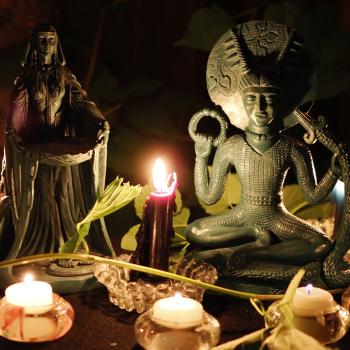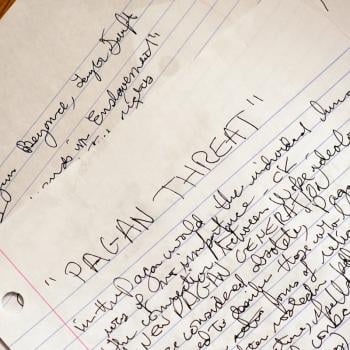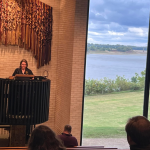No one can be absolutely objective about religion, because every person must have a set of values that enable one to make life decisions. Those values always serve as the equivalent of a religion, no matter what they are called. A person who was truly neutral and value-free would experience life as being meaningless and would be in a state called anomie, which is a late and usually lethal stage of clinical depression. The best one can do is to be consciously aware of and candid about all one’s values, not have any unexamined assumptions, and try to compensate for all that when dealing with someone else’s values, religion, etc. It follows that religion is always personal, not abstract, and always about what is personal.
I argued in a previous blog—I hope convincingly—that assuming Everything began from Nothing is logically untenable. The creation stories in Genesis begin instead by asserting that God and even a chaotic form of matter preexisted His creating. The “All from Nothing” proposal was snuck in sideways as a philosophical argument. The alternative position is to suppose that Something Exists and always has existed, that is, that time has not always existed. Further, I believe that the Something is not a Thing but a Person.
“Theology” is usually understood to be (an often apologetic) study of the concept of Divinity within a specific faith community. I think it possible to have a concept of divinity that is outside all faith communities, yet foundational to them all, that accurately describes all religious phenomena as aspects of a single ultimate reality, which, I will be arguing, makes sense as being an infinite, compassionate Person —but please don’t assume that such a Person is the traditional Abrahamic concept of God. He/She/They do/es not have to be anything like that.
Similarly, physicists are trying to create a “Unified Field Theory” that will explain all phenomena in terms of a single underlying force. Such a theory would subsume quantum mechanics, which informs us that physical reality, at the level of particles, quarks, etc., is utterly different from what we think it is at our macroscopic level. (I’ve been wondering whether quantum entanglement might have anything to do with Frazer’s three laws of magic.)
Well-founded beliefs appear to be true at the scale of our ordinary world. However, they are not accurate descriptions at the scale of either particle physics or the infinite; they cannot explain the anomalies, just as Newtonian physics could not explain radioactivity or the constancy of the speed of light; and so they can generate false predictions at the level of the ordinary. Likewise, almost all the cherished beliefs in any faith community are simply wrong or, at best, parallel to Newtonian physics as a special case (meaning how things look in daily life) of general relativity and quantum mechanics. I am not, however, accepting the assumption in physics that the underlying reality is a force, something impersonal, rather than a compassionate Person.
“What?” you may ask. “Are you proposing that gravity, the strong force, and the electro-weak force are generated by a person?”
Yes, I am. That’s not as improbable as it sounds at first. You may also suppose, rightly, that my predilection for such an explanation is conditioned by my Awakening experience at age 14 that made me a Gnostic, because what I felt was a Person, not a force.
I’ve had several queries about why a Divinity needs to be infinite rather than merely Big Enough. That a divinity must be infinite seems intuitively obvious to me, but that’s never a persuasive argument. My practical and personal reason for thinking so arises from the day when I realized that I still had not taken the first drink after nine months of bitching and moaning and that the impossible had in fact been done for me. That realization required me to do a great deal of rethinking.
I’m not sure which aspect of divinity, which particular deity, is the one responsible for maintaining sobriety (maybe Dionysos?), but doing the impossible must use up a certain amount of “energy,” whether that’s physical energy or not. Suppose that deity were huge but not infinite. If so, its supply of that energy would be finite. As the human species continues to be fertile and multiply—eventually filling galaxies—at some point the need for the impossible would exceed the supply or energy and the miracle of sobriety would cease happening, which would be the same as a failure of divine compassion. I propose this is a reduction ad absurdum. The supply of energy must be unending, that is, infinite. Therefore the deity in charge of sobriety must be infinite, and if there is one infinite deity, there must be many. I know this argument will not be convincing to a person who has never felt the presence of a Person or who has never had to do the Twelve Steps (or some equivalent) in order to save his or her life. Oh, well. As C.S, Lewis said about Christianity, the Twelve Steps really do not make any sense—as long as you think you don’t need what’s being offered.
Next, consider the fundamental problem we have in trying to comprehend the concept of an infinite Divinity, let alone any Divinities themselves.
There is an objective universe, but if it is infinite (as the physicists are currently suspecting that it is), we finite beings can know only part of it, never the whole, because any map of infinity, being finite, as well as any finite number, will always approach zero asymptotically as a percentage of infinity; that is,
For all a, limx→∞ a/x → 0
For convenience, I will symbolize that fact as >>>0.
The map is not the territory. That ought to be a no-brainer, but it is often forgotten, especially by the unteachable. The points in a map of a finite territory can have a unique one-to-one correspondence with points in that territory, but not with points in an infinite territory, for the same reason that the sequence of cardinal numbers, labeled Aleph-null, which can be used to count any ordered sequence of sets with a finite number of elements, cannot be put into one-to-one correspondence with sets of (Aleph-null raised to the Aleph-null power) elements, because there is no way to decide which set comes “next.”
Any theology is an attempt to create a map of infinity and therefore also >>>0. That is, all our knowledge, however great, is infinitesimal. It is therefore impossible for us to understand an infinite deity by our own efforts. We could have dependable information about a deity only if he/she/they choose/s to give us as much of an overview of the divine plans as we are capable of understanding (although that much too will necessarily >>> 0). Every true deity, being infinite, conscious, and compassionate by nature, will always choose to do so. But keep in mind that a deity will always face problems in attempting to communicate with finite beings, and that finite beings will almost always misunderstand the communication. As Alan Watts once said, it is easier and safer to remember that the Divine is not an old man with a beard in the sky than it is to remember that the Divine is also not what Aquinas’ Summa describes.
Curiously, evil, being merely the absence of the good, also >>>0. That is, evil has no ontological existence, just as light does but darkness does not. (Augustine had some really dreadful ideas, but that was one of his better ones.)















